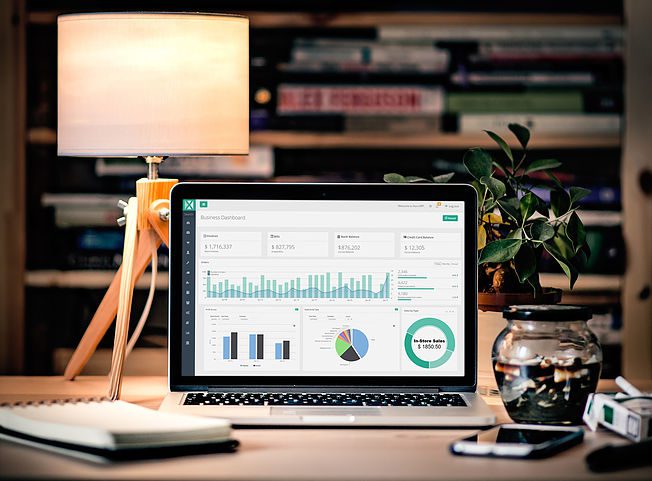
Advent of E-commerce
Earlier in the 1990s, the most common method of exchanging information between trading partners was carried out through EDI (Electronic Data Interchange) with most ERP vendors incorporating EDI facilities to their products. However, the promise and potential that EDI showed in its early stage could not be achieved as it couldn’t address several challenges organizations faced such as high set up cost, customization flexibility, and cohesion requirement.
However, the advancement of internet since the mid-1990s saw the inception and the exponential growth of electronic commerce aka E-commerce. It revolutionized the way of buying and selling products through the internet, that too at a relatively low cost. It also involves processes such as invoicing, payments, and performance monitoring; all managed electronically.
Challenges without an ERP
Businesses today have recognized the potential of E-commerce. It serves as a launch pad that will expand their reach to the world over the internet while simultaneously eliminating unnecessary elements in the supply chain thereby enabling buying and selling of goods and services at lower cost.
Today, 51% Americans prefer to shop online, a figure that rises up to 67% if we only consider millennials and up to 56% for “Gen Xers”. Online sales will increase from $335 billion in 2015 to $523 billion in 2020, a forecasted growth of 9.32% per year. Although, according to a research carried out earlier in 2017, the annual growth rate stands at a whopping 14%.
To be competitive in today’s cutthroat and cluttered market, where the numbers of e-stores are growing in numbers like mushrooms, simply having an e-store is just not good enough. Businesses need to be quick, responsive, and accurate when a transaction is made. This can be challenging if your e-store is not integrated with your ERP. Here are the few problems that will rear its ugly head if you try to run your E-commerce store without ERP integration:
Data Redundancy & Time Consumption
Manual input of product information and inventory into 2 separate systems and then keeping them synchronized. This will become problematic as you grow your business and expand the number of your products. This is time-consuming and prone to human error.
Increased Costs
Controlling costs will become more and more difficult as you grow. Spending unnecessary capital on resources that eat up their paid hours by simply entering orders, inventory, product and shipping information into multiple systems manually. Again, you have to account for the time taken and the inevitable mistakes that will occur while entering data manually.
Increased Efficiency
Managing inventory and pricing updates in two separate systems may result in data inaccuracies, operational inefficiencies, and customer confusion. In worse case scenarios, it could even lead to selling items that you don’t have in stock.
Bad Customer Experience
The little inefficiencies pointed above will ultimately lead to customer dissatisfaction. In this hyper-competitive E-commerce landscape of today, there is absolutely no chance a business can prosper without satisfied customers.
Automating your business processes via ERP integration will enable you to reduce your operating costs and improve productivity, efficiency, and accuracy. This will lead to growing online sales, maximizing profits, and cultivating many satisfied customers. Ergo, a prospering E-commerce business!
Advent of ERP
Enterprise Resource Planning (ERP) evolved almost at the same time with a primary focus on optimized workflows and improved productivity for organizations. ERP systems evolved from the mainframe era to the Client Server(C/S) application in the 90s. Now, the adoption of internet technology allows users to access an ERP system from anywhere and at any time, thus enabling various automation functionalities like Sales Force Automation and much more.
Why use a cloud ERP Software?
Currently, most E-commerce enterprises manage their business using onsite ERP solutions. Onsite ERP solutions are installed locally into a company’s hardware and servers and then managed by the in-house IT staff or third party vendors. However, there is a new player in town now!
The cloud ERP offers complete access and management of data centrally via the cloud, i.e., the internet. This empowers you to access and control all features that are vital to run your business from anywhere in the world. Moreover, you can do this through your smartphone, tablets or laptops. These features include sales and order processing, invoicing, accounting, inventory management, customer relationship management and much more that are critical to any e-commerce businesses. The fact that cloud ERPs are slowly but surely on the rise can be backed by the fact that they have seen a growth from 11% to 27% over the past year.
A Cloud ERP offers more than just growth; it offers the potential to transform your e-commerce business.
- Save Money! One of the major advantages that a cloud ERP holds over on-premise an ERP is the reduced implementation costs. It allows you to save money on hardware and data servers. Maintenance and support costs are also reduced as the cloud vendor handles the upgrades and updates. Moreover, you pay only for the computing resources and features you need with a fixed subscription rates.
- It increases your operational efficiency with real-time reporting of order status, inventory control, shipping details, purchase orders, BOM and complete history.
- One concern that may have kept you apprehensive about moving to a cloud ERP is the perceived security risk. However, it is nothing but a common misconception as more and more cloud ERP providers are enhancing their security to meet customer needs. In fact, 94% of SMBs have reported enhanced security benefits since moving to the cloud.
- It integrates smoothly with your current ERP, financial, and EDI systems.
- Provide 24/7 access to your customers of your products with a mobile responsive website that enables them to view your products, customer-specific pricing, and purchase history.
- It allows you to streamline your process with improved communication with the system internally and externally.
- With gradual expansion over the years, your business may have outgrown your existing ERP system. Switching to a cloud-based ERP software offers scalability and customization benefits that lack in an onsite ERP system.
- No need to implement hardware and software at remote locations anymore as you can access the system from anywhere using the internet. This gives your company a chance to expand geographically into international territories at minimal costs.
If you are still apprehensive about using a cloud ERP for your business, think again!
There are loads of challenges that every E-commerce businesses face on a daily basis. The primary challenge is handling the market and showing value for the clients. Let ERPs help you to scale your business with its fantastic inputs and its empowering feature sets. Take control of your E-commerce business today and scale its growth like no other in your business!
Looking for a powerful cloud based ERP Software for your business? XoroERP is here to help you! Why don’t you sign up for a demo and check out its features in live action?




